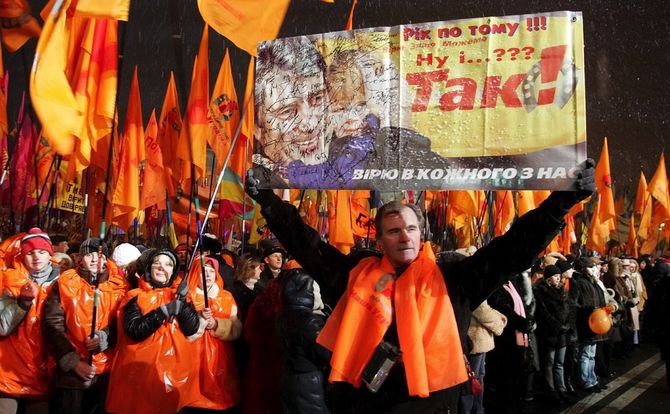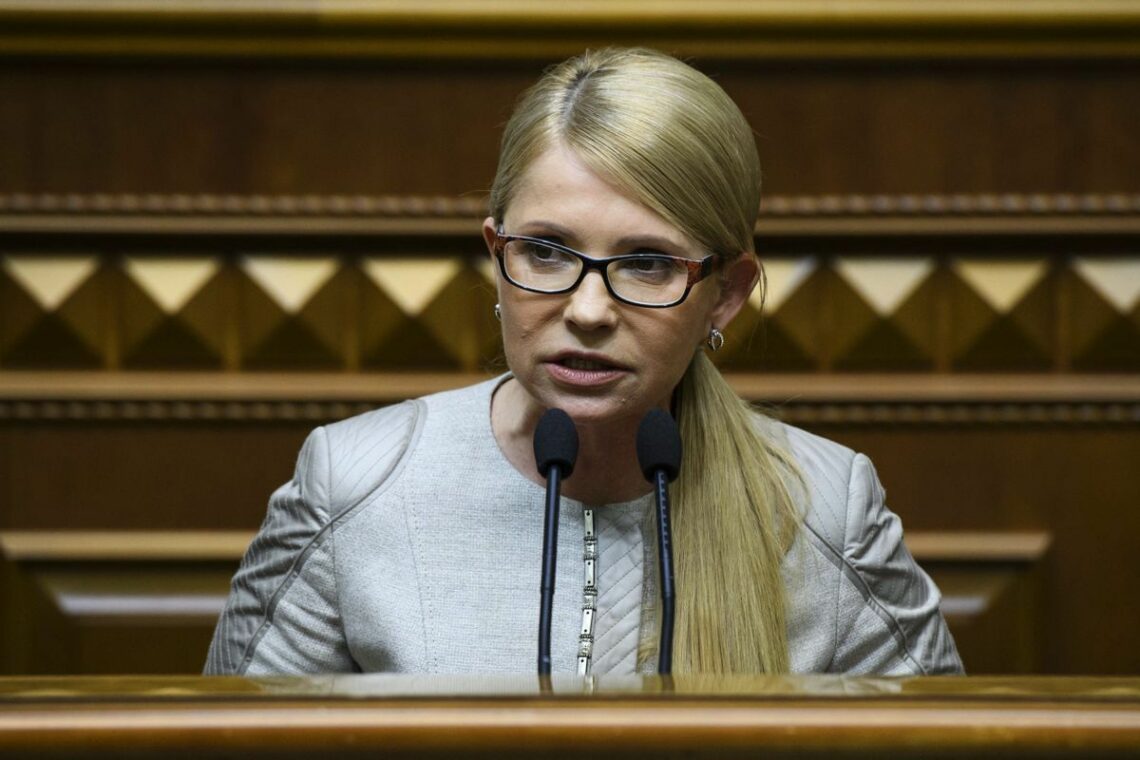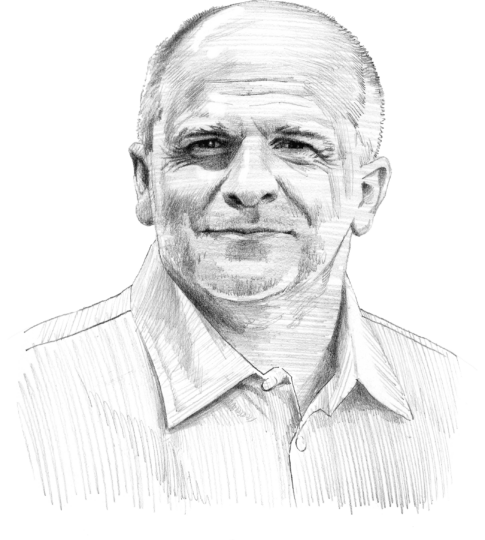Ukraine’s revolution nears a test
It might have been Ukraine’s last calm summer for a while. There will be a reckoning with what succeeded and what did not after the revolution of 2013-2014. Ukraine will choose a president and members of the parliament in the upcoming 2019 elections.

In a nutshell
- Foreign support and economic growth have bolstered Ukraine’s reform movement
- Dismantling the post-Soviet oligarchy has proved an almost insuperable task
- The public is not yet convinced by the government’s progress in fighting corruption
- Alienated voters could produce a surprise in 2019, but reforms won’t be reversed
This may have been independent Ukraine’s last calm summer for a while. There will soon be a reckoning with what succeeded and what did not after the revolution of 2013-2014, during which the eyes of the world were on Kiev. Ukrainians will elect a president early next year, with parliamentary elections to follow in the fall. The very fact that the postrevolutionary government managed to survive this long should be counted as a success.
If we compare the current situation to conditions after the overthrow of President Leonid Kuchma’s regime during the Orange Revolution of 2004-2005, the assessment is mostly positive. But comparative analysis is one thing, and the opinion of Ukrainian voters is another. In 2019 they will get their say on the revolution, and there are plenty of indications that their verdict on the post-Maidan political elites will be harsh.
Positive balance
In terms of results, this time was really different from the Orange Revolution. The West finally engaged in transforming its partner to the East, while Ukrainians took the need for change more seriously than a decade earlier.
For the first time, the United States and the European Union gave Ukraine a comprehensive strategic umbrella that covered political, military and economic issues. The Western commitment to Ukraine was serious and highly visible. The cabinet crises that plagued Kiev after 2014 were often defused with the help of the U.S. or EU ambassadors, whose words carried weight because Ukrainian governments could no longer afford to ignore Western advice.
Western support comes at a price: it is conditioned on reforms that are far from popular with the public.
Foreign clout was quite evident in June 2018, when Ukraine adopted a new anti-corruption law. U.S. and EU officials had made it clear that passage of the bill was a precondition for further Western support, including military aid and the release of additional loan tranches from the International Monetary Fund (IMF). Everyone realized that failure to approve the anti-corruption measures would cause the West to withdraw its security guarantee, with immediate and severe repercussions for Ukraine’s entire political spectrum.
A large part of the legitimacy of Ukraine’s postrevolutionary governments is based not on any electoral mandate but on the political support extended by the West. This takes the form of both concrete assistance and symbolic recognition, such as state visits and praise by foreign leaders. Western support comes at a price, however: it is conditioned on reforms that are far from popular with the public.
American support
The U.S., especially, has invested far too much political capital and military assistance in Ukraine to allow the authorities in Kiev to fail spectacularly. Letting Ukraine slip back into the Russian sphere of influence, as it did under the rule of President Viktor Yanukovych (2010-2014), would be an unmitigated disaster for Washington.
This marks the first time that the U.S. has made such a clear and wide-ranging commitment to a country in the post-Soviet space. (The three Baltic states – Estonia, Latvia and Lithuania – are different cases.) During a 2017 meeting with Ukrainian President Petro Poroshenko, President Donald Trump took note that American investors had established a strong presence in Ukraine and asked Mr. Poroshenko to “take good care of them,” making the request twice for emphasis. During an August 2018 visit to Kiev, Mr. Trump’s national security advisor, John Bolton, stressed that Ukraine needed alternative suppliers of natural gas.
Energy interests are largely responsible for the firm U.S. economic and military commitment to Ukraine.
This clear nod at U.S. shale producers highlights the role played by economic calculations. American companies have the technology to meet the energy needs of East Central Europe through deliveries of liquefied natural gas, but they need political cover from Washington. The expansion of U.S. energy interests is largely responsible for the firm American economic and military commitment to Ukraine, regardless of who occupies the White House. It also explains why the U.S. and Ukraine want to curb Russian energy interests, including construction of the Nord Stream II gas pipeline.
One lure for both U.S. and European companies is Ukraine’s improving economic growth, which is expected to rebound to 3.2 percent this year and 3.5 percent in 2019, up from just 2 percent in 2016. While this is far from Asian Tiger performance, it is enough to believe in the outlook for at least medium-term stability.
Another selling point is the privatization of more than 20 large state-owned enterprises, planned to begin this year. These asset sales will include some of Ukraine’s biggest companies in the energy and power, mining and metals sectors. The sale of smaller state-owned companies has already started, and a new privatization law provides basic protections for foreign investors.
Buyers of large companies will have the right to demand that all legal agreements be enforceable under English and Welsh law, and they will have recourse to international arbitration at the Stockholm Chamber of Commerce. The legislation has even been praised in a report by the Atlantic Council, a Washington-based think tank often critical of Ukraine.
The U.S. and the EU countries have also found other ways to support the authorities in Kiev. These multiple support channels have helped bind Ukraine to the West, irrespective of the former’s political troubles or recent transatlantic tensions.
A different transformation
Ukraine’s recent development has usually been compared to the transformation of Central Europe after the collapse of the Soviet system. In Ukraine’s case, however, we are not dealing with a postcommunist transformation. What is happening there is more like an attempt to dismantle or weaken an oligarchic system, while simultaneously introducing more efficient and representative forms of government. All this in a country that is historically divided and is in a state of war, with part of its territory occupied due to foreign military intervention.
Since 2014, Ukraine has been dealing with its own peculiar problems that bear little resemblance to those of the postcommunist transition several decades ago. The three thorniest are the question of oligarchy and its effect on state development, corruption, and the alienation of political elites (or, from a bottom-up perspective, their rejection by ordinary voters).
Without bloodshed or confiscating property, it would be difficult to curb the influence of the post-Soviet oligarchs.
Giving good advice on how to deal with a post-Soviet oligarchy is difficult. It can be likened to a particularly rare and malignant tumor that is untreatable by ordinary methods. In the countries of the former USSR, they have been impossible to eradicate.
Ukraine is a particularly severe case. The local oligarchs succeeded long ago in legalizing their assets, which are now being managed by second- or even third-generation owners. They are active in national politics and, in some areas, have even assumed some of the functions of the state. They have diversified their political portfolio by backing a wide spectrum of political parties. Without bloodshed or the mass confiscation of property, it would be very difficult to eliminate their influence. Yet resorting to such measures would be extremely dangerous for the Ukrainian state.
Another possibility would be to borrow tried-and-tested methods used by the U.S. government against its own financial oligarchs in the early 1900s: increasing personal income taxes, eliminating loopholes, adopting antitrust laws, enforcing anti-corruption statutes, and introducing other measures that support the middle class and small businesses. Ukraine has had only modest success in these areas since 2014.
Trust shortage
The fight against corruption is a topic unto itself, because corruption is much more deeply and systematically rooted in Ukraine than many people appreciate. Its roots go back to the Romanovs and the Soviet era.
The government is quite proud of the National Anti-Corruption Bureau of Ukraine (NABU), a specialized force that has been called “the police for fat cats.” It is fully independent of any government authority, including public prosecutors. But even successful efforts to root out corruption in specific milieus, such as academia, do little to change the widespread perception that corruption is rampant, because people keep seeing it in other places.
Bribes are paid for healthcare, to reserve a place in preschool, or in other everyday situations. Many people treat such kickbacks as “ordinary fees” for public services. On the other hand, the media constantly refers to corruption at the highest levels of government, while foreign correspondents and diplomats automatically associate Ukraine with corruption.
All this reinforces the conviction that the country remains thoroughly corrupt despite success in curbing or eliminating abuses in the school system, law enforcement and the military. In some quarters, corruption remains acceptable or is even treated as part of the social norm.

The biggest obstacle to administrative reform is the public’s absolute mistrust of the political elite. Support for Ukrainian political parties is capped at 10-15 percent of the electorate, which is about the highest approval rating that a local politician can expect.
There is nothing new or surprising about this. But a dearth of popular support has been the main difficulty in carrying out reforms of the type favored by the IMF, which require cuts in social spending. People will only accept paying more for municipal services or a higher electricity bill if they believe politicians are reasonably honest and competent. If trust in government is compromised, the political system becomes vulnerable to populism and the corrosive effects of Russian propaganda.
The general lack of trust in Ukrainian society could be a greater obstacle to transformation than the oligarchy and corruption. This is what makes the current reckoning with the 2014 revolution and its aftermath so explosive. If reform fatigue prevails, the voters may allow themselves to be seduced by populists, and a popular backlash will gather momentum. The question is, who will set themselves up as the leader of the counterrevolutionary wave?
Reelection bid
To determine which elections are most important, it’s usually enough to check a country’s constitution. This method does not work in Ukraine, however. The country is a textbook example of why political culture and norms can outweigh the letter of the law. As in many other countries in the post-Soviet space, the key to power in Ukraine is the presidency, even though the prime minister and the government technically fulfill most executive functions.
The scenario that appeared almost certain several months ago and still seems probable is that Petro Poroshenko will win a second term in 2019. The incumbent president provides a personal guarantee that Ukraine will stick to its present course in domestic and international politics. He has reoriented the country’s diplomatic orientation toward the U.S., Canada, Germany and the EU. Even so, President Poroshenko is very much on the defensive.
President Poroshenko and his bloc have lost most of their support from the 2014 elections.
Fairly or unfairly, he is blamed for the often-failed reforms and price increases that have lowered the standard of living of many Ukrainians. This is evident in the opinion polls, where Mr. Poroshenko and his bloc have lost most of their support from the 2014 presidential and parliamentary elections (where they polled 54 percent and 22 percent, respectively). There is hope of winning some of these voters back in next year’s campaigns, especially since they can fall back on the usual argument of wartime governments that it is best not to change leadership in a national crisis.
To Mr. Poroshenko’s credit, he capitalized on his first-round victory in 2014 to build a stable, reformist government. If he makes it through the first round of next year’s presidential elections, his chances of winning the runoff and a second term are excellent. However, recent opinion polls suggest that he will start the campaign with support in the single digits. This by itself is not alarming, given Ukrainians’ extremely low levels of declared support for any party or politician. But if Mr. Poroshenko fails to make up lost ground and squeak through to the runoff, all bets are off.
Transfer of power
Yulia Tymoshenko certainly has a good shot at the second round with about 20 percent support. Other contenders include Anatoliy Hrytsenko, a former defense minister who is long on experience but short on charisma; Svyatoslav Vakarchuk, a rock musician with plenty of sex appeal; and Yuriy Boyko of the Opposition Bloc. All of these candidates have drawn 4 to 8 percent support in the opinion polls, but Ms. Tymoshenko – who still benefits from her status as a political prisoner under the Yanukovych regime – retains a definite edge.
For now, she is concentrating her fire on the reforms sponsored by President Poroshenko and the two prime ministers backed during his first term – Arseniy Yatsenyuk (2014-2016) and Volodymyr Groysman (2016-present). After receiving an unexpectedly poor 12.8 percent result in 2014, Ms. Tymoshenko turned herself into a leading opponent of price increases for energy and other services. This has won her some popularity with ordinary Ukrainians but has not endeared her to Ukraine’s Western partners, who insist on a reform program.
The expectation in Kiev is that it will come down to a Poroshenko-Tymoshenko runoff. The president will stress that he has shaken up the court system and municipal governments while winning international recognition. Ms. Tymoshenko, who lately has been in top form, will have all the advantages of an opposition candidate and can promise the moon and the stars. There will be plenty of time to worry about fulfilling these promises later, if she wins.
Ms. Tymoshenko is not a fresh face on the political scene, but that could be an advantage.
One serious handicap of the Tymoshenko campaign is that she is not a fresh face on the political scene. For Ukraine’s foreign partners, however, that could prove to be an advantage. As a two-time prime minister, she knows the ins and outs of the economy and has a keen understanding of the country’s international position. If she again wins power, Ms. Tymoshenko’s actions are likely to be less radical than her words.
Any changing of the guard next year in Kiev will bring lots of heated rhetoric and turnover in senior positions, but little serious questioning of the achievements of the past four years. Further reassurance is provided by the presence on Ms. Tymoshenko’s team of people trusted in the West, especially former Foreign Minister Borys Tarasyuk.
Twice in the past three decades – in the early 1990s and after the Orange Revolution of 2004-2005 – national reform movements in Ukraine were rolled back by Russian-supported counterrevolutions led by politicians rooted in the Soviet system. Today, there appear to be no anti-Western or counterrevolutionary parties in Kiev with a serious chance of taking power. Even if Ukraine’s reformers lose next year’s elections, it appears the changes wrought by their revolution will endure.








